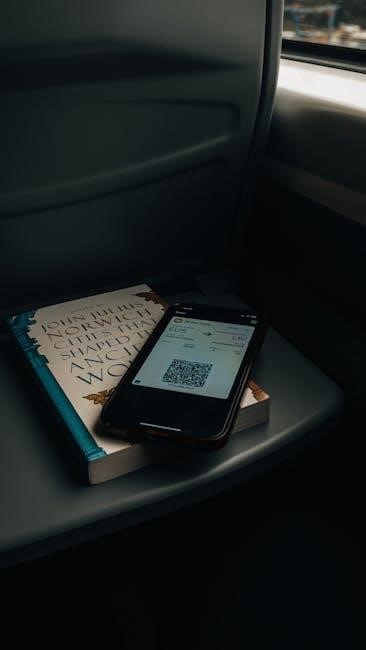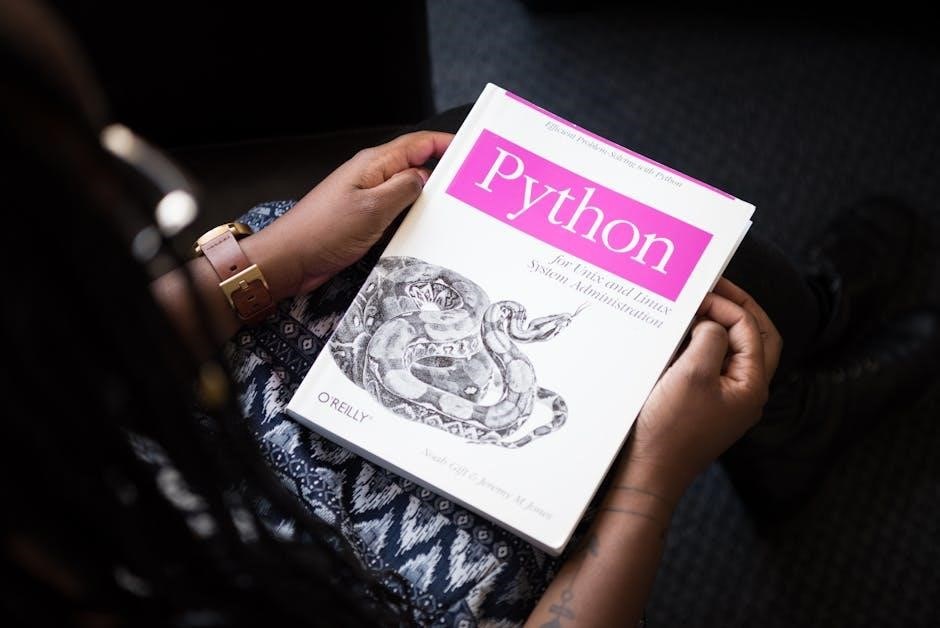Code Talker is a poignant memoir by Chester Nez, the last surviving original Navajo Code Talker, offering a rare glimpse into his life and wartime experiences. This book provides a unique perspective on the Navajo Code Talkers’ role in WWII, blending personal history with cultural significance, making it an invaluable historical resource.
Overview of the Book and Its Significance
Code Talker is a memoir by Chester Nez, the last surviving original Navajo Code Talker, detailing his life on the Navajo Reservation, WWII experiences, and the creation of the Navajo Code. This book is historically significant as it provides a firsthand account of the Navajo Code Talkers’ pivotal role in military communications during WWII. Nez’s story bridges personal narrative with the broader history of the Navajo people, offering insights into their cultural resilience and contributions to the war effort; The memoir also serves as a vital resource for preserving Navajo language and history, making it a unique and invaluable historical document.

Chester Nez: The Last Surviving Member of the Original 29 Navajo Code Talkers
Chester Nez, born in 1921, was the last living original Navajo Code Talker, whose memoir Code Talker offers a unique personal account of his life and contributions to WWII. As one of the 29 original developers of the Navajo Code, Nez played a crucial role in creating an unbreakable communication system for the U.S. military. His experiences, detailed in the book, provide a rare glimpse into the challenges and triumphs of the Navajo Code Talkers. Nez’s legacy is one of bravery, cultural preservation, and historical significance, making his memoir an essential read for understanding this pivotal chapter in American history.

The Navajo Code Talkers Program During World War II
The Navajo Code Talkers program, established in 1942, utilized the Navajo language to create an unbreakable code, crucial for secure military communications during the Pacific Theater.
Development of the Navajo Code
The Navajo code was developed by combining the Navajo language with a complex system of substitution and transposition. The original 29 Navajo Code Talkers created a dictionary of over 600 terms, including military equipment and tactics, which was later expanded to thousands of entries. This code was never deciphered by enemy forces, making it a crucial factor in Allied victories in the Pacific. The development process involved meticulous planning and collaboration, ensuring the code’s effectiveness and security throughout World War II.
The Role of Code Talkers in Military Communications
The Navajo Code Talkers played a pivotal role in military communications during World War II, transmitting critical messages securely using their native language. Their coded system, based on the Navajo tongue, was never deciphered by enemies, ensuring swift and accurate transmission of strategic information. Code Talkers operated in key battles, including Iwo Jima and Guadalcanal, providing real-time intelligence that significantly aided Allied victories. Their efforts ensured that vital commands were relayed without delay, making them indispensable to military operations in the Pacific Theater and earning them a legendary status in history.
Chester Nez’s Memoir: A Rare Glimpse into History
Code Talker is Chester Nez’s firsthand account, detailing his life on the Navajo Reservation and WWII experiences. It offers a unique historical perspective on the Navajo Code Talkers’ contributions.
Life Growing Up on the Navajo Reservation

Chester Nez’s memoir vividly describes his childhood on the Navajo Reservation, highlighting the challenges and rich cultural heritage that shaped his identity. Growing up in the Checkerboard Area, Nez faced difficulties such as poverty and limited access to education, yet he was deeply rooted in Navajo traditions and language. His early life laid the foundation for his resilience and adaptability, qualities that would later prove crucial during his military service. This personal narrative offers a unique window into the experiences of a young Navajo boy navigating a rapidly changing world.
Nez’s Experiences During World War II
Chester Nez’s memoir details his extraordinary journey as a Navajo Code Talker during World War II. At just 17, he was recruited to develop a secret communication system using the Navajo language. Nez played a pivotal role in creating the Navajo Code, which was never deciphered by the enemy. He served in the Pacific Theater, transmitting vital messages that saved countless lives. The code’s success relied on its complexity and the Navajo language’s uniqueness. Nez’s wartime experiences highlight his bravery, ingenuity, and dedication to preserving his culture while serving his country. His story is a testament to the Code Talkers’ enduring legacy.

The Cultural and Historical Impact of the Book
Code Talker preserves Navajo history, honors wartime contributions, and offers insights into indigenous culture, making it a vital resource for historical and cultural studies and education.
Preserving Navajo Culture and Language

Chester Nez’s memoir, Code Talker, plays a vital role in preserving Navajo culture and language by detailing the creation and use of the Navajo code during WWII. The book highlights the significance of the Navajo language as a critical tool for military communications, showcasing its complexity and uniqueness. By sharing his experiences, Nez ensures that the Navajo code’s history and cultural importance are not forgotten. The memoir also bridges generations, offering younger Navajo people a connection to their heritage and language, while educating the broader public about the invaluable contributions of Navajo code talkers to American history.
Breaking the Silence: The Legacy of the Navajo Code Talkers

Chester Nez’s memoir, Code Talker, breaks the silence surrounding the Navajo Code Talkers’ contributions during WWII. For decades, their role remained classified, but Nez’s firsthand account reveals their pivotal impact on military communications. His story not only educates readers about the code’s creation and use but also honors the bravery and ingenuity of the Navajo soldiers. By sharing his experiences, Nez ensures that their legacy is preserved and celebrated, shedding light on a chapter of history that was once hidden. The book serves as a testament to the enduring importance of their contributions.
Availability of “Code Talker” in PDF and Other Formats
Code Talker by Chester Nez is available in PDF, ePub, and MOBI formats for easy access. Readers can download it legally through online platforms or borrow from libraries.
Downloading the Book Legally
Code Talker by Chester Nez can be legally downloaded in PDF, ePub, or MOBI formats through reputable online platforms like Amazon, Google Books, or Barnes & Noble. Ensure to purchase or borrow from authorized sources to support the author and publishers. Many libraries also offer digital lending services, allowing free access with a membership. Always avoid unauthorized websites to prevent copyright infringement and protect the quality of the content. Legal downloads ensure you receive the complete, high-quality version of this significant historical memoir.
Accessing the PDF Through Libraries and Online Platforms
Accessing the PDF of Code Talker is convenient through libraries and online platforms. Many public libraries offer digital copies via services like OverDrive or Hoopla, requiring only a library membership. Additionally, platforms such as Google Books, Amazon, or Barnes & Noble provide access to the PDF for purchase or borrowing. These options ensure easy and legal access to Chester Nez’s memoir, preserving the integrity of the content while making it widely available to readers interested in Navajo history and WWII contributions. This accessibility helps in spreading the significant story of the Navajo Code Talkers.
Reception and Reviews of the Book
Code Talker has received widespread acclaim for its authentic and inspiring firsthand account of WWII history. Reviewers praise its historical significance and heartfelt storytelling, making it a must-read for history enthusiasts.
Academic and Reader Feedback
Code Talker has garnered significant praise from both academics and readers for its authentic portrayal of the Navajo Code Talkers’ experiences during WWII. Scholars highlight its historical accuracy and unique perspective, while readers appreciate Nez’s storytelling and the book’s emotional depth. The memoir is often recommended in educational settings for its ability to bridge cultural and historical understanding. Many reviewers have noted its importance in preserving indigenous contributions to American history, making it a valuable resource for both enthusiasts and educators. The book’s accessibility ensures its relevance for a wide audience.
Comparisons with Other Books on the Navajo Code Talkers
While several books explore the Navajo Code Talkers, Code Talker stands out as the only firsthand account from an original member. Unlike historical analyses or fictionalized narratives, Nez’s memoir offers a deeply personal and authentic perspective. Books like Joseph Bruchac’s Code Talker: A Novel provide fictionalized accounts, whereas Nez’s work delivers raw, unfiltered experiences. This memoir is often praised for its emotional depth and historical accuracy, making it a primary source for understanding the Navajo Code Talkers’ contributions during WWII. Its unique voice sets it apart from other works on the subject.
Educational Value of “Code Talker”
Code Talker is a vital educational resource, offering insights into Navajo culture, WWII history, and the code talkers’ contributions, making it a unique teaching tool for history and cultural studies.
Using the Memoir in History and Cultural Studies
Code Talker serves as a powerful primary source for history and cultural studies, offering firsthand insights into the Navajo Code Talkers’ contributions during WWII. The memoir bridges historical events with cultural traditions, providing a unique perspective on the intersection of indigenous heritage and military strategy. Educators can use it to teach students about the significance of code talking, its impact on wartime communications, and the broader context of Navajo experiences. The book aligns with educational frameworks, making it an invaluable resource for curriculum development and fostering a deeper understanding of Navajo culture and history.
Teaching the Navajo Code Talkers’ History in Schools

Code Talker is an invaluable resource for teaching the Navajo Code Talkers’ history in schools, offering a firsthand account of their contributions during WWII. The memoir provides a unique perspective on the development and use of the Navajo code, making it an engaging tool for history and language arts classes. Teachers can integrate the book into lesson plans to explore themes of cultural identity, patriotism, and ingenuity. It also fosters discussions on diversity and the often-overlooked role of indigenous peoples in American history, inspiring students to learn about the significance of the Navajo language and its impact on wartime communications.

Chester Nez’s memoir honors the Navajo Code Talkers’ bravery and ingenuity, preserving their legacy for future generations to learn from and appreciate their pivotal role in history.
Lessons Learned from the Book
Code Talker offers profound lessons about resilience, cultural pride, and the importance of preserving heritage. Chester Nez’s story highlights the power of diversity and ingenuity, showcasing how the Navajo language became a critical tool in wartime. The memoir educates readers about the Navajo Code Talkers’ unprecedented contributions to history, while also reflecting on the challenges of growing up on a reservation. It underscores the value of teamwork and sacrifice, inspiring future generations to honor indigenous cultures and their pivotal roles in shaping global events. The book serves as a testament to the enduring spirit of the Navajo people.
The Importance of Preserving Indigenous Contributions to History
Code Talker emphasizes the vital need to preserve indigenous contributions to history, ensuring their stories are not forgotten. Chester Nez’s memoir highlights the Navajo Code Talkers’ pivotal role in WWII, showcasing their ingenuity and cultural resilience. By documenting their experiences, the book bridges generational gaps, allowing younger generations to learn from and appreciate the sacrifices of indigenous heroes. It also underscores the importance of honoring and celebrating diverse cultures, promoting a more inclusive understanding of history. Preserving these narratives fosters pride and respect for indigenous heritage, enriching our collective historical consciousness.

Leave a Reply
You must be logged in to post a comment.